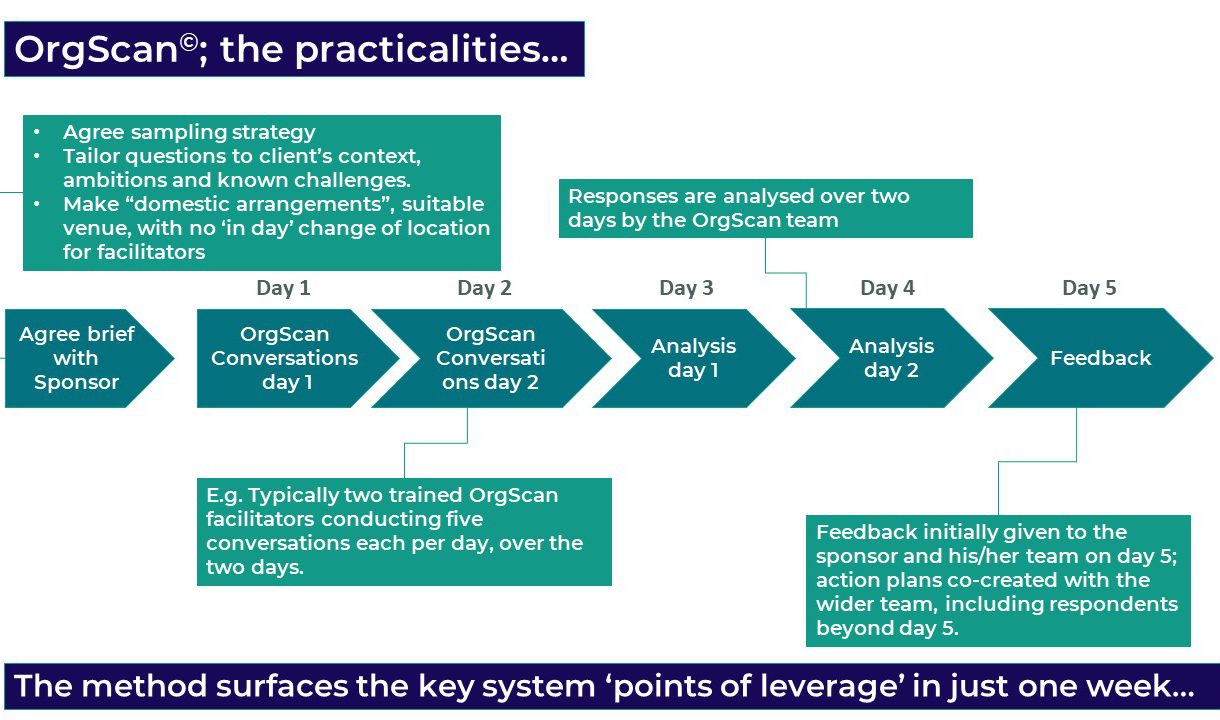OrgScan, enabling you to innovate management and enhance your culture
OrgScan is for you if:
- Your organisation’s culture is not what you’d like it to be; you are losing good people or worse still they are burning-out
- Your performance as an organisation is not what you’d like it to be; you are losing customers or competitive advantage
- You are about to embark on a journey of organisational change; here OrgScan helps because knowing where you are starting from is as important as knowing where you are going
- You are looking for something with rich insights to base your people strategy on; something more robust that an employee survey or more sensitive to your context than the latest OD fad.
What is OrgScan©?
OrgScan© is a rapid diagnostic that has been developed to identify the underlying system conditions (cultural, structural, process, resource etc.) at play in an organisation and some of the appropriate levers for change. The approach is unique to VitalOrg and can be completed within a week. Whether planning an intervention or facing a challenge, the OrgScan© diagnosis gives an objective, evidence-based analysis of the current reality of the organisation. In doing so it avoids the pitfalls of change challenges that address pseudo problems and not their causes, or perhaps attempting to address problems that are perceived by those with a voice but not really the priority.
How is OrgScan©
different?
Like many discovery processes OrgScan© uses structured conversations between facilitator and respondents. It has, however, some key distinguishing features; these have been developed to address five requirements of discovery interventions where understanding the whole-system perspective of the organisation is important.
- The first is to develop a valid understanding of the organisation involving only a short time-scale and low commitment of resources. The speed of the discovery process is important, since the system that is the organisation is always changing as is its external environment, thus invalidating any analysis that is slow. Additionally, short timescales and low resources also lead to low costs.
- The second is to develop an understanding of the organisation that reaches into the hidden and obscure, as well as those features that are ‘visible, and on-the-surface’. This includes all the ‘soft systems’ and cultural dimensions, as well as the harder, process and structure orientated characteristics of the organisation.
- Associated with this is the risk of data contamination occurring. The OrgScan© uses indirect, non-judgemental questions that reduce this risk to negligible levels. The insights generated are grounded in reality, not in miss-interpreted questions or “party-line / personal agenda” responses.
- There is clear evidence that mono-dimensional initiatives (like “digital solutions” that fail to address the human side of change) seldom deliver significant gains in performance. The need is to capture all of the issues that are currently impacting performance, and then design an intervention that addresses all the priority issues. The OrgScan© is configured to provide breadth as well as depth.
- Finally, there is the happy consequence of the ‘intervention effect’ – that which gets measured gets changed. A very normal consiquence of the OrgScan© is that respondents are positively motivated towards expecting change, and they spread that expectation within their networks. By adjusting the approach, this effect can be built up or reduced depending on the objectives for the project. If desired, the effect can be targeted so that the change is in the direction that is needed.
How does it work in practice?
Alongside the sponsor and their team, we carefully select a representative sample from the overall population of employees, every function / team / location needs to be represented, within the various levels of hierarchy need to be represented also. Also, be aware of character; think about those people who will be open & honest and aim to have a healthy mix of enthusiasts and sceptics. For most organisations 12 – 25 respondents should be sufficient.
The conversations are held by a facilitator, and follow a semi-structured approach, they take between 40 and 80 minutes, the vast majority of participants report that the conversations are enjoyable and helpful to them.
The indirect questioning technique means that it is not the specific content of the individual responses that brings the insight, but much more the patterns and consistencies / inconsistencies that aid understanding. These are identified when the responses are brought together and analysed. This means that we can guarantee absolute confidentiality; we never quote any statement, unattributed or otherwise.

What is the output?
The output is typically a set of main themes which are the key factors that the organisation needs to work on (the “what”) each with underlying, more specific addressable aspects impacting the organisations behaviour and performance (the “how”). These factors are almost always interrelated, thus are typically represented in a mind-map format and used to structure the feedback conversation with the sponsoring team.
How does that help?
Before embarking on any journey of change or improvement, we believe that it is really important to have good data about where you are starting from, the nature of the system and the sorts of things that are driving behaviour. Regardless of the nature of change (technology change, integration, reorganisation, merger etc.) or type of intervention (coaching, training, leadership development, continual improvement, introduction of new technology and the like) having this understanding helps optimise the intervention design and highlights the potential pit-falls.
If suitable individuals can be made available, we encourage the client team to put forward their own people to become acquainted with the process of running an OrgScan©. That way they can re-run the diagnostic themselves (with support from us doing the analysis) after a suitable period, thereby better understanding how things have changed and what the next set of improvements might be.
“I highly recommend Ben and Denis for the change they can make in your ways of working, and improvements to your business. They have such a personal approach, and genuinely care that you achieve your goals.”
Martina Arnold – HR Manager at Ventrolla
At VitalOrg we actively promote The Vitality Index (VI) ahead of our other diagnostics for the simple reason that for progressive, purposeful or scaling organisations it is the only diagnostic they need. OrgScan has a place for organisations where a more “open” and holistic perspective is deemed to be useful. The nature of the questions enables OrgScan self-configure, thereby identifying the priorities for the organisation.

